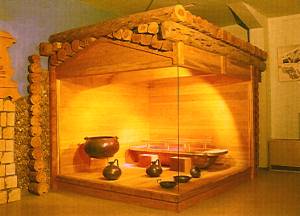|
|
|
|
|
|
The name Midas is inextricably associated with Gordion. A number of Phrygian kings bore this name, and over the centuries a kind of composite mythical figure has emerged around whom a number of legends have grown up. The best known of these is that of Midas and the golden touch. King Midas of Phrygia, a kingdom in Asia Minor, was a good and gracious man, though overly fond of luxury and wealth. Supposedly he founded the ancient city of Ancyra, the modern Ankara, capital of Turkey. Now it happend that the wine god Dionysus with his entourage passed through the realm of Midas on his way to India where he hoped to establish his worship and the use of wine. Sileinus, one of the god's attendants, wandering off drunk from the grand procession was captured by peasants who brought him before the king. Midas ordered his release and wined and dined him royally. Dionysus, grateful for the kindness done his companion, offered Midas the grant of any one wish, and Midas asked for the gift of the golden touch. |
|
| Dionysus in his divine widsom saw where this
would inevitably lead, but depsite his plea the Midas reconsider, his request, the king
persisted and the god was bound to honor his promise. Soon enough Midas learned that even
his food would turn to gold. He begged Dionysus to take back the gift, which he could not
do, but he told Midas instead to bathe in the River Pactolus. He did, and the power
granted the king was somehow transferred to the river. And so the Pactolus in historical
times was far famed for the grains of gold that could be washed from its sands. Another tale tells of how Midas was called upon to judge a musical contest between Apollo and the satyr Pan (Marsyas). |
|

|
Now Midas himself chiefly worshipped the god Pan, who played beautiful music on his pipes, and Pan had challenged Apollo to a music contest with King Midas as judge. The King Midas awarded the prize to Apollo's lyre-playing rather than Pan for the music of his pipes. Midas made no secret of his opinion that Pan was the better musician. In anger, Apollo changed the king's ears to those of an ass, and the humiliated Midas took to wearing the Phrygian hat - a kind of stocking cap - pulled down over his ears. Only his barber knew the truth, and he had been sworn to secrecy. But the knowledge got to be more than the gossipy old barber could contain. So he went out into the country, dug a hole in a solitary place, whispered the secret into the hole, and then covered it up much relieved. But the following spring reeds and grases grew on the spot where the barber had planted his secret, and the wind whispering through them told the sibilant secret over and over again: |
|
These legends are thought to relate to the successor of Gordios, about whom another story that may have some basis in reality exists. It tells how, during the reign of Gordios, an oracle foretold that a poor man who would enter Gordion by ox cart would one day rule over the Phrygians. As the king and nobles were discussing this prediction, a farmer named Midas arrived at the city in his cart Gordios, who had no heirs, saw this as the fulfillment of the prophecy and named Midas his successor. Subsequently Midas had his cart placed in the temple of Cybele on the Gordion acropolis, where it was to stand for half a millennium, Somehow the belief arose that whoever untied the knot that fixed the cart to its yoke would become master of Asia. During his stay in the city Alexander the Great took it upon himself to undo the knot, severing it with his sword. |
| The final king of the Phrygian Empire was also called Midas, and some concrete information about his reign survives. He is referred to in Assyrian records as Mitas of Mushki, who paid tribute to the Assyrians after being defeated in battle by them. He is thought to have reigned from 725 BC to 696 BC and the Greek historian Herodotus describes how he dedicated his throne at the Delphic shrine of Apollo and married the daughter of one of the Ionian kings. | 
|
| |
|
Our Hotel | Turkey | Cappadocia | Daily Tours | Views | Guestbook | Request Form | Home |
|